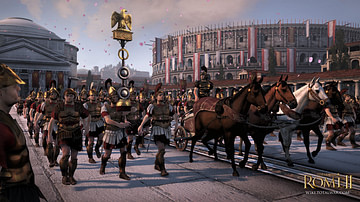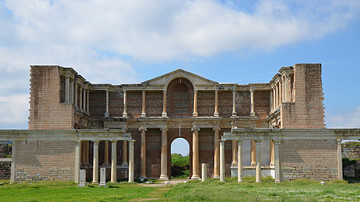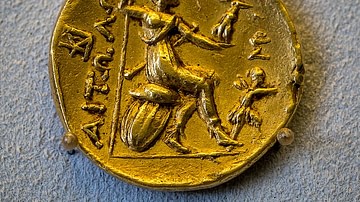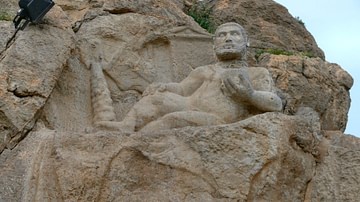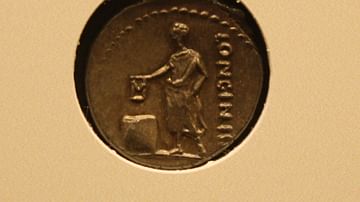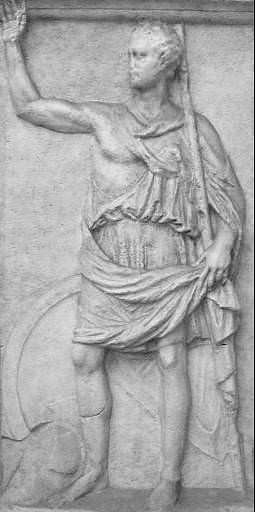
Polybius (l. c. 208-125 BCE) was, whilst a Greek historian, a Roman historian, in that his work dealt with explaining how Rome came to be so great. Like the three Classical Greek Historians, Polybius himself had personal experiences and inquiries into what he was studying at a level that included and went beyond reading scrolls and memoirs stored in a library.
With Thucydides it might be argued that the defining moments in his life that helped to create the history that he wrote were his generalship and then later his exile, which would probably have allowed him to better assess the war from both the Spartan as well as Athenian side. Polybius himself probably had some notion of military ways; when he was around thirty he was elected as hipparchus (cavalry general) and was also at this time supporting the independence of his home, Megalopolis. However, Polybius' most defining moment was when, aged around thirty (c. 167 BCE), he was taken as a political prisoner of war to Rome, following his father (Lycortas) remaining neutral in Rome's war against the Macedonian Perseus: Polybius was one of one thousand prominent Achaeans taken to Rome.
In Rome Polybius became the responsibility of Aemilius Paulus, a Roman of the highest distinction who had himself led the Romans to victory in the third Macedonian war. Polybius was then tasked by Aemilius Paulus with the education of his children, Fabius and Scipio. Polybius would remain on friendly terms with the latter as he rose to power, culminating in the events of 146 BCE, the sack of Carthage, and of Corinth. As such Polybius, whilst originally anti-Roman, came over to light of the Latins, and in the process gained a great amount of first-hand experience into the running of the Republic, an example of which can be seen in his description of the layout of the Roman army at 6.19-42.
The events in Polybius' Histories span 118 years from 264- 146 BCE. Originally the work dealt with events up to 167 BC, but after witnessnessing the events 146 BCE, Polybius later included them in his narrative.
One of the most defining features about Polybius as an historian is that he seems to have a more developed sense of historiography than the earlier writers, or at least he expresses it in clearer detail at points, and in greater quantity than Thucydides had done, for example. The main book that deals with this is book XII, which in itself is mainly a criticism of Timaeus as an historian. The main point that Polybius makes is that it is the duty of the historian to remain free of bias; in 12.7 Polybius says of Timaeus that he "frequently makes false statements… his judgement… [is] darkened by prejudice…" whereas Polybius, having stated at 1.14 that "once a man takes up the role of historian he must discard all considerations of this kind [biases towards friends and country]… he will often have to have to speak well of his enemies…" can be seen enacting this sentiment at 1.64, when Polybius says of Hamilcar that he is "… the general who must be acknowledged as the greatest on either side, both in daring and in genius…"
Further to this Polybius discusses the importance of being a contemporary historian, as well as the importance of having experience in politics and military fields, and of collecting and questioning sources:
12.25b
the peculiar function of history is to discover, in the first place, the words actually spoken, whatever they were, and next to ascertain the reason why what was done or spoken led to failure or success. For the mere statement of fact may interest us but is of no benefit to us: but when we add the cause of it, study of history becomes fruitful.
12.25e
in the same fashion political history too consists of three parts… [The study of memoirs; Geography; Political activity]
12.25h
it is difficult, perhaps, to have taken a personal part and been one of the performers in every kind of event, but it is necessary to have had experience of the most important and those of commonest occurrence.
As such, Polybius' History is a very solid account of the period.
Little is known about Polybius' later life with much certainty. What we do know is that most of it must have been spent writing up his works (the Histories being the only surviving one) and that he must have died at some point after the construction of the Via Domitia in 118 BCE, since this is chronologically the latest event mentioned in his Histories. This perhaps gives some credit to the Pseudo-Lucian's claim that Polybius died at the age of 82, having fallen from his horse.


